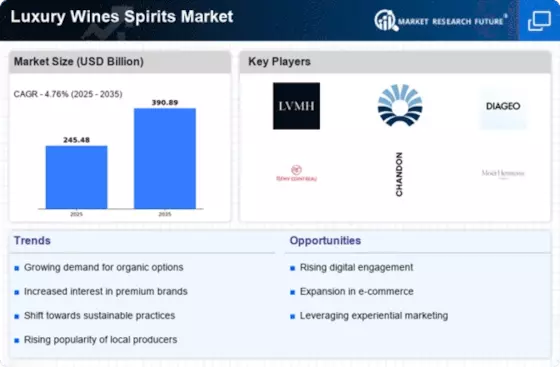Rising Disposable Incomes
The Europe Luxury Wines Spirits Market appears to be positively influenced by the increasing disposable incomes of consumers across various European nations. As individuals experience growth in their financial capabilities, they tend to allocate a larger portion of their budgets towards premium and luxury products, including fine wines and spirits. For instance, countries like Germany and France have reported a steady rise in household incomes, which correlates with a growing demand for high-end alcoholic beverages. This trend is particularly evident among millennials and affluent consumers who seek unique and exclusive experiences. The luxury segment is projected to grow as more consumers prioritize quality over quantity, thereby driving the overall market forward.
Cultural Heritage and Tradition
The rich cultural heritage and tradition associated with wine and spirits production in Europe significantly bolster the Europe Luxury Wines Spirits Market. Countries such as Italy, France, and Spain have long histories of winemaking, which not only enhances the appeal of their products but also fosters a sense of pride among consumers. This cultural significance often translates into a willingness to invest in premium offerings, as consumers seek to connect with their roots and support local artisans. The emphasis on traditional production methods, such as organic and biodynamic practices, further elevates the status of these products, making them more desirable in the luxury segment. As a result, the market is likely to benefit from the ongoing appreciation for heritage brands.
Growing Interest in Premiumization
The trend of premiumization is becoming increasingly prominent within the Europe Luxury Wines Spirits Market. Consumers are progressively gravitating towards higher-quality products, often opting for artisanal and craft options that promise superior taste and authenticity. This shift is evident in the rising sales of premium wines and spirits, which have outpaced those of standard offerings in recent years. For example, the market for premium wines in Europe is projected to grow at a compound annual growth rate of over 5% through 2026. This inclination towards premium products is driven by a desire for unique experiences and the perception that luxury items confer status. Consequently, brands are responding by enhancing their offerings and marketing strategies to cater to this discerning consumer base.
Health Consciousness and Wellness Trends
The increasing health consciousness among consumers is shaping the Europe Luxury Wines Spirits Market in notable ways. As individuals become more aware of the health implications of their consumption choices, there is a growing demand for organic, low-calorie, and sustainably produced wines and spirits. This trend is particularly pronounced in countries like the United Kingdom and Sweden, where consumers are actively seeking products that align with their wellness goals. The market is responding by introducing a range of healthier options, such as organic wines and spirits with lower alcohol content. This shift not only caters to health-conscious consumers but also enhances the overall appeal of luxury products, as they are perceived as more responsible choices.
Influence of Social Media and Digital Marketing
The role of social media and digital marketing in shaping consumer preferences is increasingly evident within the Europe Luxury Wines Spirits Market. Brands are leveraging platforms like Instagram and Facebook to engage with consumers, showcasing their products through visually appealing content and storytelling. This digital engagement is particularly effective in reaching younger demographics who are more inclined to share their experiences online. As a result, luxury wine and spirit brands are investing in innovative marketing strategies to enhance their online presence and connect with potential customers. The impact of influencer marketing cannot be overlooked, as collaborations with social media personalities can significantly boost brand visibility and desirability. This trend is likely to continue evolving, further driving the growth of the luxury segment.






















